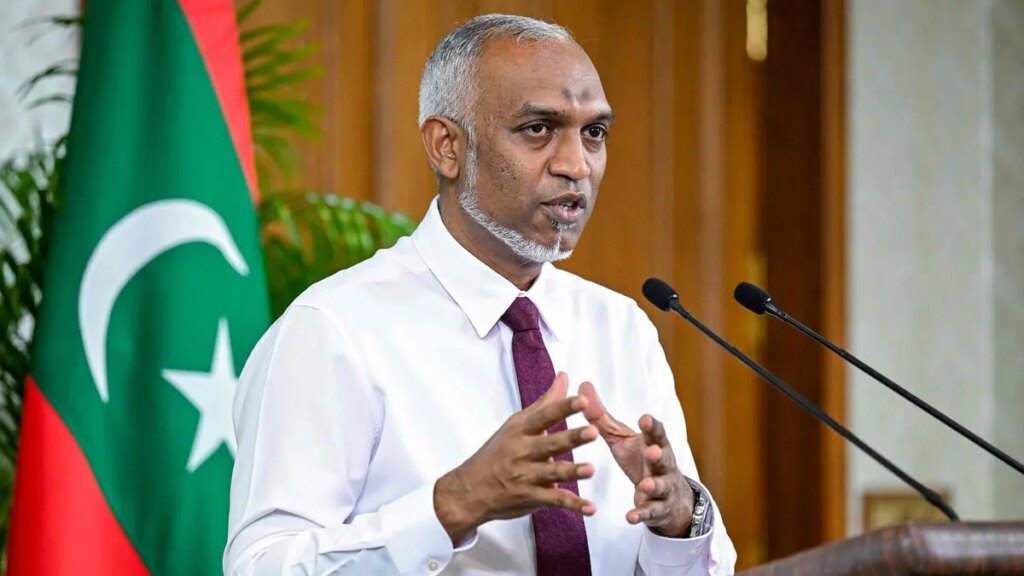Maldives, a Sunni Islamic nation critical to India’s maritime security and traditionally guided by an “India first” policy until recently, is looking to strengthen its ties with Islamic nations in Asia, aligning with its new government’s emphasis on Islamic values of life and nationalism. A series of agreements with Islamic countries—on trade, culture and development aid—indicates the new direction the country proposes to take.
This has grave implications for India, at a time when the country’s relationship with Pakistan is at its lowest ebb in decades. Maldivian President Mohamed Muizzu has tried to balance the ties with India, as the latter remains a major donor to the island nation. Under former President Ibu Solih (2018-23), the India–Maldives relationship had flourished, after floundering during the tenure of his predecessor, Abdulla Yameen (2013-18). Muizzu has turned out to be more politically savvy than Yameen: while Yameen allowed China to become a major partner, Muizzu is roping in as many Islamic countries as possible, in addition to China.
On May 4, the cash-strapped Maldivian government announced the setting up of the Maldives International Financial Centre (MIFC), a financial free zone in the capital Male, which will compete with Sri Lanka’s Chinese-owned Port City. MIFC has been set up in association with Dubai-based MBS Global Investments, which is “the investment arm of the Private Office of Sheikh Nayef Bin Eid Al Thani [a Qatari Royal]”. The $8.8 billion venture will be a tax-free haven for blockchain digital assets and other financial instruments. Muizzu hailed this as a “symbol of economic resilience” for Maldives and asserted that this “will set new global benchmarks”.
In late April, Muizzu was in Malaysia, seeking greater cooperation. Speaking after a meeting with Muizzu, Malaysian Prime Minister Anwar Ibrahim said both countries shared strong bilateral relations, familiar policies, and political system, and there was great potential to expand collaboration in trade, investment, digital innovation, and sustainability.
Also Read | India-Maldives ties suffer unprecedented damage due to social media fracas
On April 29, the International Islamic University of Malaysia conferred an honorary doctorate in “Islamic leadership and Madani development” on Muizzu during his official tour to the country. Muizzu also delivered a lecture on “Intellectual Renaissance: Unveiling the Scientific and Modern Development of Islamic Civilisation”.
Muizzu described this as a “meaningful opportunity to contribute to the ongoing discourse on Islamic solidarity and progress of the Ummah”. In normal circumstances, this would not have attracted much attention; former Presidents, including Maumoon Abdul Gayoom, and a host of Maldivian politicians have spent months in the country, where Islam is the official religion.
Muizzu’s brand of geopolitics
But Muizzu’s visit to Malaysia should be juxtaposed with the brand of geopolitics he is steering Maldives towards. The Maldivian government banned the arrival of Israeli tourists on April 16 this year to protest Israel’s repeated bombing of the Gaza Strip. In 2024, about 11,000 Israelis visited Maldives, despite the absence of diplomatic relations between the two countries.
Maldives has also been active in the International Court of Justice where it filed a declaration of intervention in October 2024 in the South Africa versus Israel case. In May 2024, Maldives was one of the 93 countries that supported the International Criminal Court’s arrest warrant against Israeli Prime Minister Benjamin Netanyahu and Hamas leaders. Also, in his speech at the UN General Assembly that year, Muizzu wanted Israel to be held accountable for the genocide in Gaza.

The Maldivian government banned the arrival of Israeli tourists on April 16 this year, to protest Israel’s repeated bombing of the Gaza Strip. In picture, spectators at a drone show to celebrate Eid ul-Fitr in Hulhumale on March 30.
| Photo Credit:
MOHAMED AFRAH/AFP
Muizzu has requested and received military equipment from both Turkey, which is a Muslim majority country on the path of greater Islamisation, and the United Arab Emirates (UAE), where Islam is the official religion. Turkey has provided military drones (Bayraktar TB2) and gifted a fast attack craft to Maldives. Commenting on the development, strategic commentator Brahma Chellaney told the press: “Maldives’ new Islamist-leaning President expelled Indian troops, cozied up to China, and spent $37 million buying Turkish drones his tiny nation does not need…Yet, it [Maldives] is seeking debt relief from India.”
Muizzu has also made two trips to Saudi Arabia, and has requested wide-ranging support, some of which is yet to materialise. He also met the Saudi Foreign Minister Prince Faisal bin Farhan Al Saud on the sidelines of the 79th session of UNGA. The largest mosque in Maldives, the King Salman mosque, is a gift from Saudi Arabia. It has the capacity to cater to 10,000 people. This was built before Muizzu was elected President.
Highlights
- Maldives has also been active in the International Court of Justice and filed a declaration of intervention in October 2024 in the South Africa versus Israel case.
- In May 2024, Maldives was one of the 93 countries which supported ICC’s arrest warrant against Israeli Prime Minister Benjamin Netanyahu and Hamas leaders.
- In his speech at the UN General Assembly that year, Muizzu wanted Israel to be held accountable for the genocide in Gaza.
Breaking diplomatic tradition
In fact, after taking over as President on November 17, 2023, Muizzu broke the diplomatic tradition of Maldivian Presidents visiting India first. Instead, he chose to travel to Turkey. He was in the UAE twice, first in November 2023 for COP 28 (the annual UN climate conference held under the UN Framework Convention on Climate Change), and then again in February 2024 for the World Governments Summit. He also visited Saudi Arabia twice in 2024—in May for Umrah and in November for the Arab-Islamic summit.
These visits reflect interests that go well beyond the Maldives’ traditional cultural priorities. Muizzu, who was part of the “India-Out” campaign ahead of his 2023 election—aimed at removing Indian troops stationed in the Maldives to maintain helicopters and aircraft used for medical emergencies—has been actively seeking to diversify partnerships, gradually shifting from reliance on India towards closer ties with Islamic nations and China.
Also Read | India-Maldives row: Is social media driving foreign policy?
However, politicians in Maldives acknowledge that India is a reality that they have to live with. Since early 2024, when relations took a sharp downturn, both sides have made attempts to ease tensions. The New Delhi visit of Maldivian Foreign Minister Abdulla Khaleel and Defence Minister Mohamed Ghassan Maumoon this year marked the first major step towards improving relations. A release from Union Ministry of External Affairs said that Khaleel met External Affairs Minister S.Jaishankar and “followed-up on issues that need further focus” after Muizzu’s New Delhi visit in October 2024.
In the Union Budget for 2025-2026, aid to Maldives was increased to Rs.600 crore from Rs.470 crore in 2024-25. India has also extended a currency swap facility to help stabilise the Maldivian economy.
While India remains the most important development and security partner for Maldives, heightened tensions between India and Pakistan has given countries in the neighbourhood, including Maldives, the breathing space to reset relations.
Source:https://frontline.thehindu.com/world-affairs/maldives-india-relations-muizzu-foreign-policy-islamic-shift/article69540697.ece

